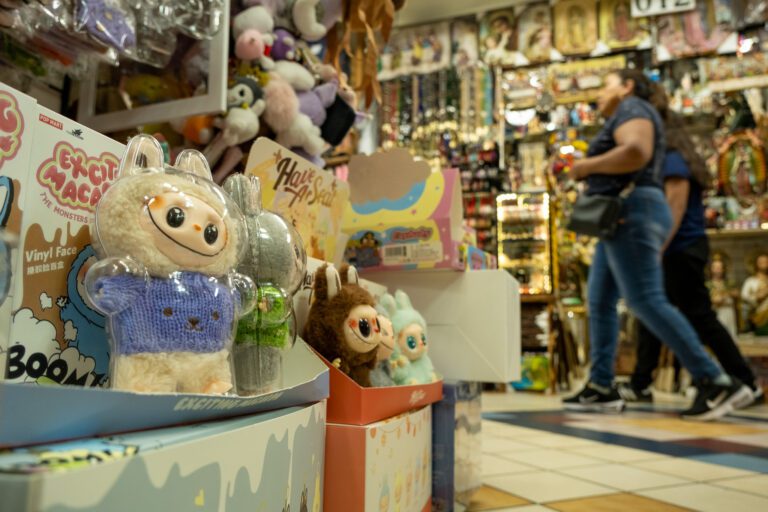Across from a vendor stall at El Mercadito adorned with El Niño Dios dolls, rosaries and paintings of La Virgen and The Last Supper, dozens of grinning elf-like figurines are stealing the spotlight.
Shoppers, young and old, stop to admire the dolls dressed in Dodgers gear, Gucci overalls or popular fast-food-chain-inspired outfits.
“I kind of like the Starbucks uniform,” one customer whispered to a family member. A young girl tugged at her mom’s shirt, asking when she could get her first Labubu — the wildly popular rabbit-eared toy from Chinese manufacturer Pop Mart that’s taken the Eastside, and much of the world, by storm.
“Everybody at school has one,” 12-year-old Kevin Martinez said, curious if the Labubus on display were authentic. “I think people find them cute and then it becomes a popularity thing. But I think the trend might go away one day.”
While many turn to online sales to score the latest collection, the Labubu craze has become a cash cow for local vendors and small businesses — from Cesar Chavez Avenue street sellers to Eastside shopkeepers capitalizing on the soaring demand for the tiny dolls. Vendors are riding the trend to draw crowds, but they’re also building a mini-economy, offering affordable prices and creating community.
The frenzy has led Enar Romero to make Labubus the centerpiece of his toy and collectible shop at El Mercadito. A wall is dedicated to miniature clothing options — including what appear to be Gucci and Prada knock-offs — and tiny plastic cameras and glasses to further accessorize what’s become a fashion accessory in itself.
“It’s just a really hot item. I can’t really explain it,” Romero said.
And he’s not alone. Shirts and dolls of various colors are also found across corners and corridors on the Eastside. Vendors stock oversized Labubu dolls, tumblers, backpacks and T-shirts, some emblazoned with El Chavo del Ocho-themed Labubus. A few dolls — of questionable authenticity but just as much flair — wear sombreros and serapes.

Inside the Eastside Labubu economy
On Pop Mart’s website, dolls from a series called “The Monsters” sell for around $30, but some exclusive drops can go for much more and resell for upwards of $700. Limited or not, Labubus are known to sell out in minutes online.
Part of the craze is driven by its “blind box” model, which gives buyers a random toy from a set, according to Sandor Ferencz, a professor of international trade finance at Cal State L.A. When customers have a particular variant in mind, they’ll keep buying until they get the one they want, he said.
“If we think of the blind box as a model economically, it’s unique because it combines collectibility, scarcity and it’s random,” Ferencz said. “It monetizes this desire for that rare product, and that uncertainty, it’s successful.”
But the trend could be short-lived as President Trump’s proposed tariffs on Chinese imports threaten to raise prices and choke supply. Tariffs have been recently reduced, but that could be temporary.
Ferencz said the tariffs could hurt vendors’ ability to sell both licensed and unlicensed products, potentially driving up prices. And because the item is still a hot commodity, parents and collectors may rush to buy it before prices change.

For shoppers seeking more affordable prices, the tariffs may limit supply of unlicensed Labubu dolls and accessories. Romero, who resells authentic Labubus at his shop, says he also stocks unlicensed options at lower prices to make the trend more accessible.
“They still like it,” he said. “I even have grown-ups come up to me saying they don’t want to carry a $60 toy on their purse and get it dirty.”
But if Trump’s tariffs continue to disrupt the supply chain, he may be forced to raise prices.
“Companies are not shipping like they used to,” Romero said. “Most likely, we are going to have to change prices because of that. We don’t know, maybe next week or the following, because the merchandise is not flowing like it used to.”
Toys building community
Twenty minutes before business owner Yesenia Castro opened the doors to her restaurant, Pink & Boujee, a line wrapping around the block had formed ahead of a Labubu-themed brunch in February.
“It’s honestly been so crazy because I didn’t know how many Labubu fans there were out there,” Castro said. “We had families that came out, the moms, the grandmas, buying Labubus, dressing up their Labubus and having that connection with each other.”
After seeing people taking selfies with a human-sized Labubu and obsessing over Labubu lattes and cookies at her restaurant, she started holding a small vending pop-up to sell the coveted creatures, accessories for the dolls, Sonny Angel figurines, and other blind box toys.
The 29-year-old business owner’s first Labubu-themed brunch was so successful, she held a second similar event in April and said more may be on the way.
”It might just be a trend, but I think beyond that, it could really be like healing your inner child in a way,” Castro said, explaining how she’s seen her mom filled with excitement while unboxing Labubus.
Contrasting some analysts’ claims that Labubus are “recession proof,” Ferencz, the professor, believes, similarly to Furbies or Beanie Babies, the trend may not last forever. “It’s a bubble. And at one point this bubble will deflate,” he said.
But until it does, vendors like Romero and Castro will continue offering miniature Louis Vuitton shoes, Dodger bucket hats and clear, plastic protective carrying cases for their customers’ Labubus.


